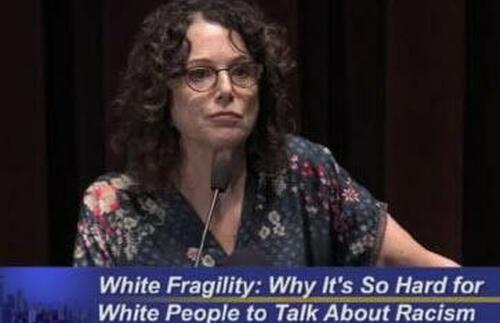Feature your business, services, products, events & news. Submit Website.
Breaking Top Featured Content:
“Plagiarism Is Plagiarism” Says Scholar Whose Work Was Lifted By Critical Race Theorist
By Ann Daily Moreno of The College Fix
A recent complaint filed with the University of Washington alleges that Professor Robin DiAngelo, a white critical race theorist and alumnus of the school, plagiarized minority scholars and others, largely within her dissertation to earn a PhD in philosophy.
The 20-page complaint, first reported by the Washington Free Beacon, outlines nearly a half-dozen scholars whose previous writings appear to have not been properly cited in DiAngelo’s work — despite her saying it’s vital to “always cite and give credit to the work of BIPOC people who have informed your thinking.”
Only one of the scholars whose work was allegedly plagiarized by DiAngelo responded to The College Fix’s request for comment — University of Melbourne professorial fellow Bronwyn Davies — whose work with co-author Rom Harré has been found in a couple of sentences within DiAngelo’s writing.
“Plagiarism is plagiarism and it is not acceptable,” Davies told The College Fix when reached for comment. “But in a thesis on Critical Race Theory, it would seem to be even more egregious.”
DiAngelo’s 2004 dissertation “Whiteness in Racial Dialogue: A Discourse Analysis” appears to lift two paragraphs from Northeastern University Asian-American Professor Thomas Nakayama, and his coauthor, Robert Krizek, without proper attribution, the Beacon reported.
The complaint also “describes dozens of cases in which DiAngelo, who rakes in almost $1 million a year in speaking fees, passed off the work of others as her own,” it added, pointing out that although DiAngelo cited her sources in the bibliography, she did not give proper attribution for in text-citations, according to the complaint, filed anonymously.
Davies describes herself as a “new materialist,” but said she is familiar with critical race theory and told The Fix she does not have “any particular dispute” with the ideology. She said it is “interesting” how the work she was doing 30 years ago is currently being used by critical race theory scholars like DiAngelo.
As for the sentences DiAngelo lifted, Davies told The Fix: “I think this falls within any definition of plagiarism, which is a pretty serious [offense] according to the rules of most universities.”
“However,” she added, “her failure to give proper attribution may not be intentional; it may be ignorance.”
“What I would like to say is that all academic work is in conversation, one way or another, with work that others have done or are doing,” she said.
“Weaving one’s own words together with the words of another involves both acknowledging they are not your own words … while not interrupting the flow of whatever idea it is you are trying to express.”
Davies said she does not have an opinion about any consequences DiAngelo should face, saying it’s up to the university.
However, Davies also said there is “a lot of trust” in publishing one’s ideas and she hopes that whoever reads her ideas will “gain new insights and benefits in their own thinking and writing.”
“Academic publishing is a huge global conversation that is often exciting, and invariably stimulates the production of new ideas and new conversations,” Davies told The Fix. “It makes me sad, and a little disappointed that, in this case, my place in the conversation has not been acknowledged—but only a little.”
Davies also said that she “wonders” about DiAngelo’s ethics since DiAngelo makes millions of dollars in events, but she is also “happy” her words could “still be helpful to the student in developing her own ideas.”
Reached for comment by The College Fix, University of Washington spokesperson Dana Robinson Slote stated campus leaders “are committed to the integrity of research conducted at the University of Washington.”
“Complaints such as this are confidential under institutional policy and relevant federal regulations. Therefore, I cannot speak to or verify the accuracy of any purported complaint, or excerpt from a complaint, that has allegedly been submitted.”
Slote refers to the university’s policies in University of Washington’s Executive Order 61.
Charleen Wilcox, spokesperson for the College of Education, where the alleged plagiarism took place and where DiAngelo currently serves as an affiliate associate professor, told The College Fix the school “does not have any comment at this time.”
DiAngelo, who has not yet replied to requests for comment, is the author of New York Times bestseller “White Fragility,” a book that DiAngelo says was written to help people of color.
DiAngelo has also been involved with the Seattle Office of Civil Rights, appointed as a leader in the mayor’s race and social justice initiative and has, in addition, reportedly made nearly $1 million per year from speaker fees and leading “anti-racism” trainings, some of which can be found on her website.
The Seattle Office of Civil Rights has not yet replied to a request for comment.
Stacey Lee, an Asian-American professor of education at the University of Wisconsin-Madison, has also been apparently plagiarized by DiAngelo in her dissertation. DiAngelo changed only one sentence, as seen circulating on X and in the original complaint.
DiAngelo also lifts material from Stacey Lee, an Asian-American professor of education at the University of Wisconsin-Madison, in which Lee summarizes the work of a third scholar, David Theo Goldberg. pic.twitter.com/950cH7gRg7
— Aaron Sibarium (@aaronsibarium) August 26, 2024
Some other scholars whom DiAngelo is accused of plagiarizing include classmate Kristin Gates Cloyes from her PhD program, Debian Marty, an emerita professor of communication at California State University, Monterey Bay, Cynthia Levine-Rasky, associate professor of Sociology at Queen University, and Harré, a philosopher and psychologist, died in 2019.
Tyler Durden
Sat, 09/07/2024 – 15:10
Continue reading at ZeroHedge.com, Click Here.




